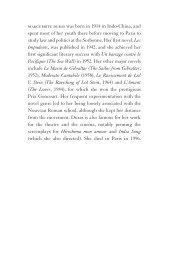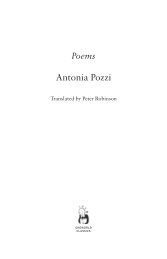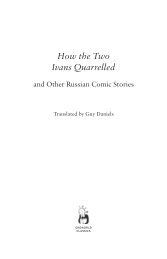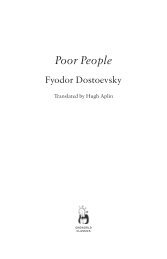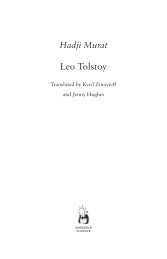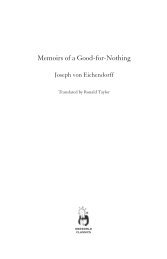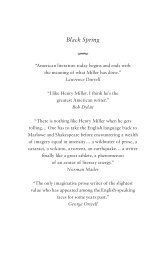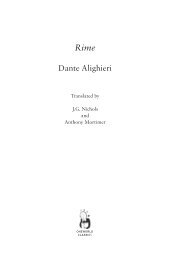Winter Notes on Summer Impressions - Alma Classics
Winter Notes on Summer Impressions - Alma Classics
Winter Notes on Summer Impressions - Alma Classics
You also want an ePaper? Increase the reach of your titles
YUMPU automatically turns print PDFs into web optimized ePapers that Google loves.
winter notes <strong>on</strong> summer impressi<strong>on</strong>s<br />
many of his thoughts <strong>on</strong> so many subjects in so few pages. It was<br />
as if, <strong>on</strong> the threshold of an entirely new epoch in his writing, he<br />
had decided to present his readers with a professi<strong>on</strong> of faith and<br />
a synopsis of his ideas. In fact, <strong>Summer</strong> Impressi<strong>on</strong>s, far from<br />
deserving their Cinderella-like treatment, ought to be regarded as a<br />
chrysalis out of which developed such masterpieces as The Devils,<br />
Crime and Punishment and The Karamazov Brothers, as well as the<br />
Diary of a Writer and the figures of Father Zosima and the Grand<br />
Inquisitor. Even the Pushkin Commemorati<strong>on</strong> Address, which was<br />
probably received with greater immediate acclamati<strong>on</strong> than anything<br />
Dostoevsky had ever written, c<strong>on</strong>tains little that is not adumbrated<br />
in <strong>Summer</strong> Impressi<strong>on</strong>s.<br />
The neglect from which <strong>Summer</strong> Impressi<strong>on</strong>s has so far suffered at<br />
the hands of literary critics is due to a variety of reas<strong>on</strong>s of which style<br />
is not the least. Dostoevsky, never a good stylist, had at that time <strong>on</strong>ly<br />
a very slender experience as a journalist and he was obviously trying<br />
to evolve a way of writing that would enable him to put his ideas<br />
across in the most digestible form he could think of. Unfortunately the<br />
most digestible form he could think of was <strong>on</strong>e which retained all his<br />
most glaring faults of style – repetitiveness, excessive colloquialism,<br />
discursiveness, slipshod grammar – and added two of its own: forced<br />
breeziness and waggish humour. The reader must make up his mind<br />
to disregard them. If he does, he will be amply repaid.<br />
2<br />
T<br />
he centre of dostoevsky’s ideas harbours a visi<strong>on</strong> of the world<br />
as a moral and spiritual unity, a “brotherly fellowship”, which<br />
must “exist in nature”, but cannot be artificially created (as both<br />
<strong>Summer</strong> Impressi<strong>on</strong>s and Father Zosima phrase it) and which<br />
expects, but most definitely does not demand, of its members a total<br />
resp<strong>on</strong>sibility for each other and for the community as a whole. It is<br />
a unity which makes each <strong>on</strong>e of us into a link in the infinite chain of<br />
causati<strong>on</strong> and which, though it may relieve each individual member<br />
of the human race of total resp<strong>on</strong>sibility and therefore total guilt,<br />
yet thrusts up<strong>on</strong> each of us the burden of a world c<strong>on</strong>science. It is<br />
this theme which Dostoevsky later expanded into an analytical novel<br />
(Crime and Punishment) and which later still he made both his Grand<br />
viii




